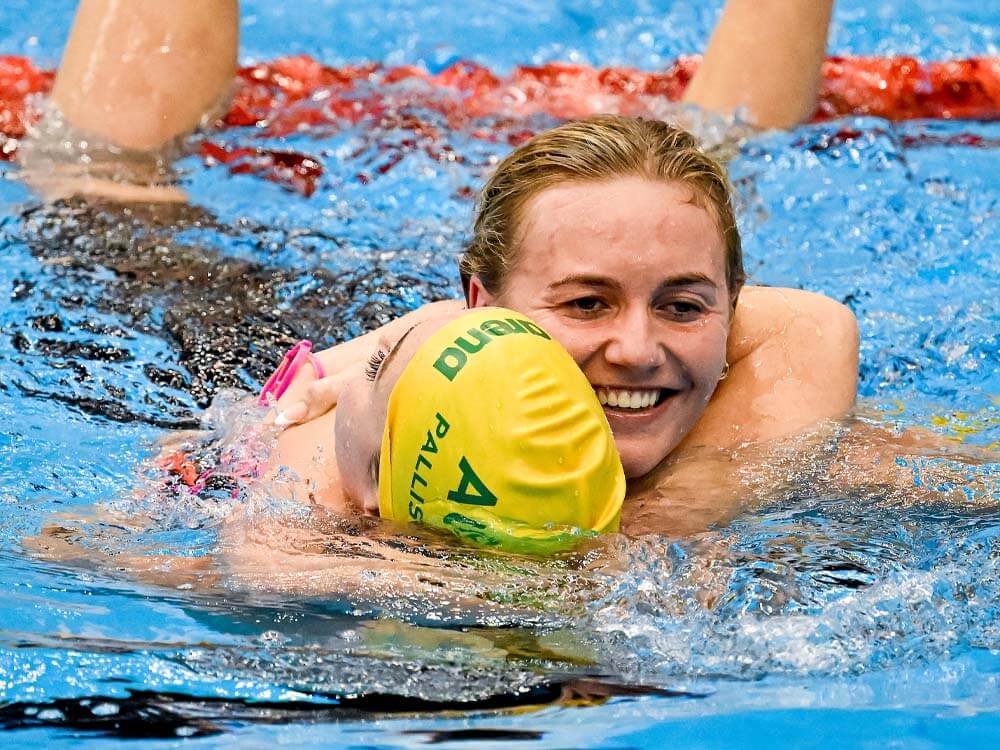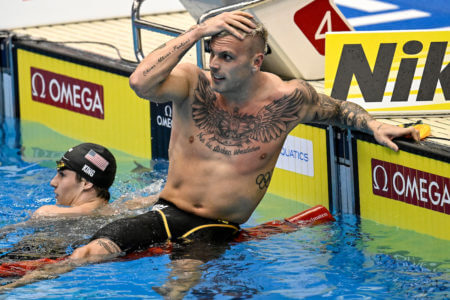Australia All Day: Dominant Dolphins Announce Intentions on Day One in Fukuoka

Editorial content for the 2023 World Aquatics Championships is sponsored by FINIS, a longtime partner of Swimming World and leading innovator of suits, goggles and equipment.

Australia All Day: Dominant Dolphins Announce Intentions on Day One in Fukuoka
Imagine an impeccable night of racing for one country: best times race after race, every swimmer managing their nerves while riding the team’s energy and multiple gold medals. Basically, any alternative that brings the best possible outcome, five consecutive coin-flips come up heads.
Now imagine telling an Australian swimming fan that Elijah Winnington, he of the incredible winning surge in the men’s 400 freestyle at last year’s World Championships, would fall to seventh in that final in 2023, more than three seconds behind his best time — and that two hours later, Australia would still be lauded as recording one of the best single evenings at a major swimming competition in recent memory.
Winnington faltering and Australia flourishing? Not so impossible, not with the exploits of 19-year-old Sam Short, who reached the wall two hundredths prior to Tunisia’s Ahmed Hafnaoui, the Olympic champion making a grand return to international racing after an extended absence last year. Both men had posted times quicker than any in the previous decade, but in a flash at the end, top honors went to the man in the yellow cap.
That would be the last time all night an Australian gold medal would come down to the finish. The next three times that a swimmer’s results in the pool merited the playing of “Advance Australia Fair” would be convincing victories, with three of the country’s biggest stars responsible for those outcomes: Ariarne Titmus killing the chance for a “Race of the Century” by battering the field, reclaiming the world record to boot; the women’s 400 free relay team firing off one historic split after another in a simply commanding effort; and Australia’s men claiming the 400 free relay world title thanks to the usual relay heroics of Kyle Chalmers.
That’s four best-case-scenario outcomes within two hours as a country with a proud swimming history left no doubt of its place in the sport’s hierarchy.

Sam Short on the medal podium after the men’s 400 freestyle — Photo Courtesy: Andrea Masini / Deepbluemedia / Insidefoto
Short is the new face to international competition, having debuted at last year’s World Championships in the 1500 free (where he did not qualify for the final) before winning 1500 free gold and 400 free silver at the Commonwealth Games. And yes, Short has looked really good this year. He upset Winnington at Australian Trials in a time of 3:43.38, and then he cut almost a second more off that time in Sunday’s preliminary heats. But to show this resolve in his first final at a global meet, going stroke-for-stroke and then beating the resurgent Olympic champion to the wall?
Then came Titmus, who continued her streak of never underperforming in a major final. She was not the favorite in this one, not with Summer McIntosh having broken her world record earlier this year. In a race also featuring legendary distance star Katie Ledecky, somehow Titmus was overshadowed even amid an extended leadup to this final. Big mistake there. Stopping McIntosh’s previously-relentless momentum while reaching 3:55 territory first in a three-second win?
In the relays, women’s gold was never in doubt with 100 free Olympic champion Emma McKeon rejoining the group after skipping the 2022 Worlds. Shayna Jack shined with the world’s fastest time in her 100 free leadoff in prelims, and Mollie O’Callaghan shrugged off injury to match that time in the final. But a combined 3:27, the sort of swim where the average split was 51.99?
Finally, the men’s relay. Yes, this was in a field with by far the least-experienced American team in many years, with Chalmers’ longtime rival Caeleb Dressel absent, and the team that swam like favorites in prelims, Great Britain, removed itself from contention with a false start. Still, getting those breaks and hitting the 47-second splits required to give Chalmers an opportunity to chase gold?
Yes, yes, yes and yes.
The men’s gold medal was the third relay honor at a World Championships for Chalmers after taking part in previous wins in the 800 free relay (2019) and mixed 400 free relay (2022). But the last time the Australians won the 400 free relay was in 2011, when Chalmers was 13.
“I actually spent a lot of time with those guys (from that team) that won in Shanghai, and they talked so highly about that moment and that feeling,” Chalmers said. “It was Matt Abood, who anchored that year, and I remember talking to him about watching James Magnussen lead off in 47 and his mouth drying up, and the same thing happened to me tonight watching Jack (Cartwright) go out in 22 and then to go 47.8, the fastest time he had done in six years.”
And sure, luck comes into play when the chance arises to open up a major competition with this sort of exquisite effort, but perhaps Australia has banked some good fortune in the pool after a run of poor performances in big moments. At the 2012 Olympics, the Australian women’s 400 free relay was the team’s only gold medal of the meet. One day later, the Aussie men were favored to back up their 400 free relay world title with Olympic gold, but the team faltered badly and ended up fourth. Four years later, the situation was scantly better; after two opening-night gold medals, the Aussies captured only one more the rest of the meet, when a then-19-year-old Chalmers snatched away the crown in the men’s 100 free.
The only significant setback of the day came in the women’s 200 IM, where Kaylee McKeown was disqualified for an illegal turn in the semifinals, eliminating her from a final in which she would have been a favorite. But McKeown has plenty of gold-medal chances remaining, including in her signature backstroke events, so not too much of a downer.

Kyle Chalmers celebrates 400 free relay gold — Photo Courtesy: Andrea Staccioli / Deepbluemedia / Insidefoto
Consider how different the situation is now. In Tokyo, Australia earned 21 total Olympic medals, and the nine gold medals doubled their number from the previous two Games combined. They finished only two golds behind the United States’ leading total of 11. At the 2022 Worlds, Australia won 17 medals and six gold despite missing many of its primary stars, including Titmus and McKeon.
Now, guess who is a clear No. 1 in the medal count after one day of swimming, four gold medals comprising all but one awarded so far (and it’s Leon Marchand, so it’s hard to fault the Aussies for not winning that).
Maybe it’s some Fukuoka magic. The last time the World Championships were held in this Japanese city was 2001, and at that meet, the Ian Thorpe-led Dolphins team led the gold-medal tally with 13. The Americans have finished tops at every other major meet since.
“It’s just amazing. Nuts. I suppose Fukuoka here in 2001 was very good. Something in the water here, I think?” McKeon said of her team’s performance. “To set it up on night one, it just gets the adrenaline going. I was in the call room for my 100 fly semi when Sam was swimming. You get goosebumps all through you. To have people swimming that quick on the team lifts us up. It sets us up for a good week.”
Yes, the medal tally will fluctuate throughout the week. America will win its share of gold medals, likely beginning Monday in the women’s 200 IM as McKeown’s absence clears the way for Kate Douglass and Alex Walsh.
But simply, Australia is better than this team has been in a long time: better coached, better equipped to take advantage of golden opportunities and better in chemistry among the swimmers. Perhaps still not quite able to rival the Americans in overall medals but back in that long-craved position of dominance.


- MEET HOMEPAGE
- COMPETITION SCHEDULE
- ENTRY LISTS
- 2022 WORLD CHAMPIONSHIPS
- LIVE RESULTS
- DAY 1 PRELIMS RESULTS
- DAY 1 FINALS RESULTS
- DAY 2 PRELIMS RESULTS
- DAY 2 FINALS RESULTS
- DAY 3 PRELIMS RESULTS
- DAY 3 FINALS RESULTS
- DAY 4 PRELIMS RESULTS
- DAY 4 FINALS RESULTS
- DAY 5 PRELIMS RESULTS
- DAY 5 FINALS RESULTS
- DAY 6 PRELIMS RESULTS
- DAY 6 FINALS RESULTS
- DAY 7 PRELIMS RESULTS
- DAY 7 FINALS RESULTS
- DAY 8 PRELIMS RESULTS
- DAY 8 FINALS RESULTS




Go Aussie Go! Oi, Oi, oi!!